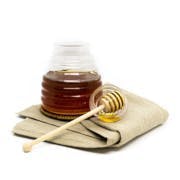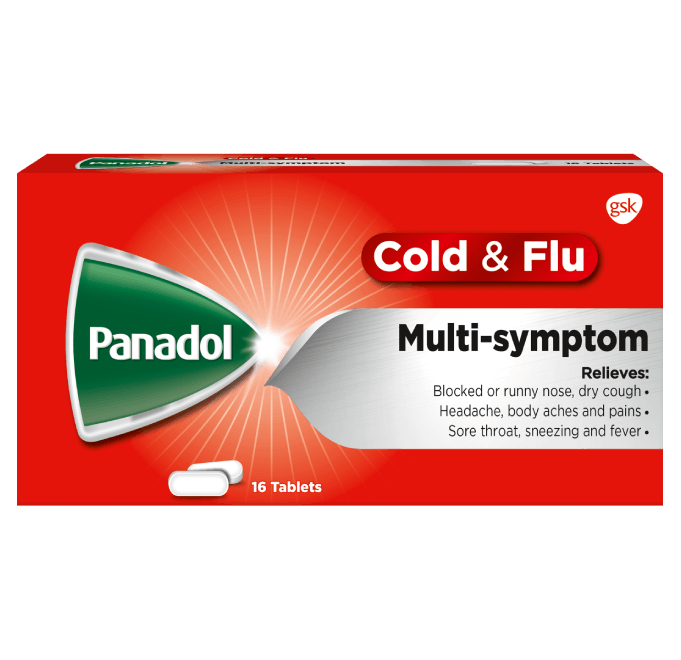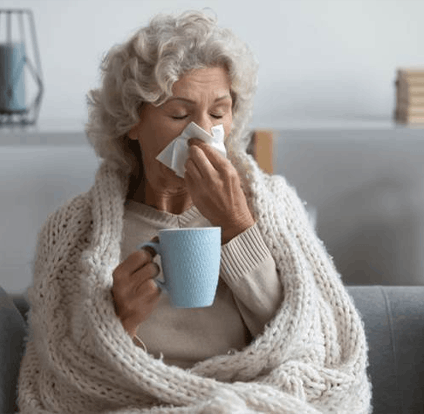No one likes coughing, but the act of coughing has a purpose – to clear the throat and airways of foreign irritants.1
Occasional coughing is normal and healthy. If an irritant stimulates your nerves, a message is sent to your brain. The brain tells the muscles in your chest and abdomen to push air out of your lungs and force the irritant out; as a result, you cough.1
Most common types of cough are wet (productive) and dry:2
- Wet cough typically brings out mucus or phlegm and are commonly caused by a cold or flu. It sounds wet because your body is pushing mucus out of your respiratory system.
- Dry cough doesn’t bring up mucus. It feels like you have a tickle in the back of your throat triggering the cough reflex. They are often caused by upper respiratory infections, such as a cold or the flu.
What causes cough?
The most common cause of a cough is a respiratory tract infection, such as a cold or flu. Respiratory tract infections are usually caused by a virus and may last from a few days to a week. Infections caused by the flu may take a little longer to clear up and can sometimes require antibiotics.3
Cough is considered acute is it last less than three weeks and considered chronic if it last longer than eight weeks (in adults).4
Some of the causes of cough are:4
Acute cough:
- Common cold.
- Flu (influenza).
- Inhaling an irritant (smoke, dust, chemicals, foreign body).
- Pneumonia.
- Whooping cough.
Chronic cough:
- Allergies
- Asthma
- Bronchitis
- Gastroesophageal reflux diseases.
There are different ways to treat a cough depending on the type of cough and its cause.

Medicine
In most cases, coughs caused by a viral infection can be treated by anti-cough and multi-symptoms products, such as Panadol Multisymptom*.
There are two common approaches to relieve a cough5
- Cough suppressants, such as Dextromethorphan HBr, which reduce the urge to cough can be used to relieve a dry cough (without mucus).7
- Expectorants, such as guaifenesin, which help to thin the mucus blocking the airways and facilitates expectoration or expulsion of phlegm, can be used to relieve a ‘wet’ cough (with phlegm and secretions).7

Home remedies
For those who like to use home remedies, honey is a popular choice. Honey soothes the throat, resulting in less irritation and possibly less coughing6
However, honey must not be given to children under 1 year old.

Avoid triggers
If you have allergies or asthma, remove allergens from your home. Avoid smoking or breathing second-hand smoke as this can make your cough worse.6
How panadol multisymptom helps
Over-the-counter cold and flu medicines such as Panadol Multisymptom* can relieve your cough and other symptoms associated with the cold & flu, and help you rest easier and aid recovery.
Panadol Multisymptom* has a multi-ingredient formula that relieves symptoms of cold and flu, with an emphasis on coughs. It contains:
Dextromethorphan HBr for dry cough relief.
Acetaminophen, for pain-relieving and fever-reducing actions.
Phenylephrine hydrochloride,, a decongestant to relieve nasal congestion.
Chlorpheniramine Maleate, sneezing relief.
Note:
Suppressants, or medicines that reduce coughing, are not recommended for some ailments, such as bronchitis.
* For more detailed information, please refer to the product labelling. In case of doubt, please seek medical advice. Your pharmacist or doctor can help advise on the most appropriate treatments for you. If your symptoms persist or worsen, you should consult your doctor.
Take only as directed and always refer to label before use.
Do not take with any other products that contain the same active ingredient(s). Taking products containing any of the same active ingredients together may lead to an overdose. Immediate medical advice should be sought in the event of an overdose, even if you feel well.
Time to see the doctor if...
Coughing varies in severity and under certain circumstances may require you to consult your doctor. If you are suffering from any of the following, you should seek medical attention:5,6
1. Your cough doesn't improve after a few days gets worse even with medication.
2. You are coughing up thick, greenish-yellow phlegm, or wheezing (high-pitched sounds, such as whistles, that occur during breathing when the airways are partially blocked.
3. You have a fever that doesn't go away or refuses to come down despite medication, or you have a fever with a rash.
4. You have difficulty breathing, feel short of breath, or are experiencing pain in the chest or abdomen.
5. You have severe or persistent vomiting.
6. You experience sudden dizziness or confusion.
References
- Irwin RS, et al. Chest 2014;146(4):885–9.
- World Health Organization. Cough and Cold Remedies for the Treatment of Acute Respiratory Infections in Young Children. Geneva, Switzerland: World Health Organization, 2001.
- Eccles R, Weber O (Eds). Common Cold. Basel, Switzerland: Birkhäuser Verlag, 2009.
- Eccles R, et al. Open J Resp Dis 2014;4:73–82.
- MSD Manual. Cough in Adults. Available at: https://www.msdmanuals.com/professional/pulmonary-disorders/symptoms-of-pulmonary-disorders/cough-in-adults. Last accessed: 20 March 2018.
- MSD Manual. Cough in Children. Available at: https://www.msdmanuals.com/professional/pediatrics/symptoms-in-infants-and-children/cough-in-children. Last accessed: 20 March 2018.
- MSD Manual (Consumer version). Cough in Adults. Available at: https://www.msdmanuals.com/home/lung-and-airway-disorders/symptoms-of-lung-disorders/cough-in-adults#v1142961. Last accessed: 20 March 2018.
- Mayo Clinic. Asthma. Available at: https://www.mayoclinic.org/diseases-conditions/asthma/symptoms-causes/syc-20369653. Last accessed: 16 April 2018.
- Mayo Clinic. Cough. https://www.mayoclinic.org/symptoms/cough/basics/when-to-see-doctor/sym-20050846. Last accessed: 20 March 2018.
- Centers for Disease Control and Prevention. The Flu: What to do if you get sick. Available at: https://www.cdc.gov/flu/takingcare.htm. Last accessed: 20 March 2018.
- Mayo Clinic. Fever treatment: Quick guide to treating a fever. Available at: https://www.mayoclinic.org/diseases-conditions/fever/in-depth/fever/art-20050997. Last accessed: 29 March 2018.
Related Products

Panadol Multisymptom
Fights the bothersome cold & flu symptoms, including dry cough...



